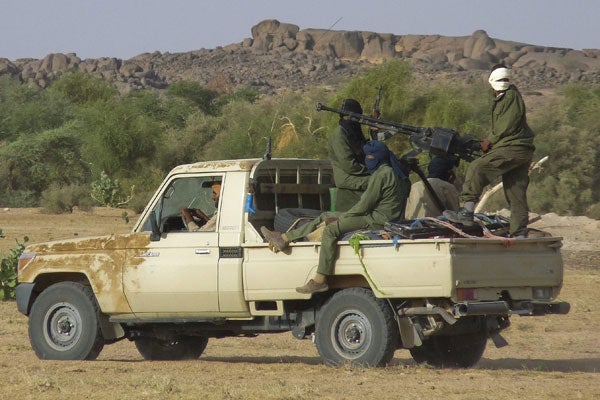The murder of America’s ambassador to Libya, Chris Stevens, and three U.S. diplomats shines a gruesome light on the region’s power vacuum and the attempt by Islamist militants to exploit it.
Following the fall of the Muammar Qadhafi regime last year, well-armed Tuareg rebels, who were once loyal to the regime returned to Africa’s Sahel region. In Mali, Tuareg combatants quickly organized the separatist group the National Movement for the Liberation of Azawad (MNLA). Supported by the Islamist Tuareg-led group Ansar al Deen, militants launched attacks on Malian military targets. In March, frustrated by the government’s lack of support, a junior military officer ignited a mutiny, leading to the military overthrow of Mali’s democratically elected president, Amadou Toumani Touré.
Weeks later, the MNLA declared northern Malian independent state. This victory was short-lived, as the ties between the MNLA and Ansar al Deen quickly deteriorated. Sidelining the MNLA, Ansar al Deen partnered with regional Islamist militants, including the Algeria-based al-Qaeda in the Islamic Maghreb, the Movement for the Oneness and Jihad in West Africa, and Boko Haram in Nigeria. Together, these groups have occupiedMali’snorthern territory(an area the size of France), enforcing sharia law and meting out brutal punishments to those who resist.
Regional governments have responded with a mix of urgency and confusion. Without a stabilized government inBamako, there is little chance that efforts to reunifyMaliwill be successful. The Economic Community of West African States has pursued negotiations withMali’s fractured interim government and Malian insurgent groups. A regional stabilization force by the African Union and the United Nations remains in the planning stages and may never be implemented.
Internationally, the United States has suspended all non-humanitarian emergency aid to Mali. The timing of the coup was particularly unfortunate, as Mali was months away from completing its Millennium Challenge Corporation compact, which would have given Mali$461 million over five years. France’s President Francois Hollande has spoken out in favor of military intervention (something that usually falls under the responsibility of the foreign ministry) but shied away from committing of French troops. The European Union is sending experts to Niger to train security forces in counterterrorism.
A crisis that took weeks to create will take years to resolve. The fallout of Libya has resulted in the expansion of radical Islamist groups vying for influence throughout the region. Add that to the myriad of pre-existing challenges, including poor central governance and porous borders, and one can expect conditions to get worse before they get better.































